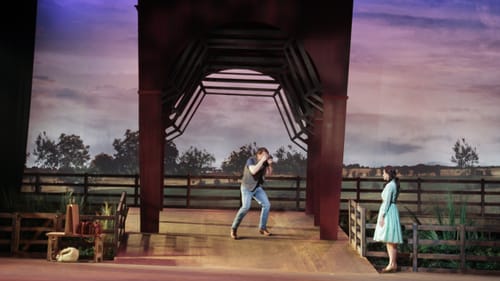Stay in the Loop
BSR publishes on a weekly schedule, with an email newsletter every Wednesday and Thursday morning. There’s no paywall, and subscribing is always free.
A bridge too far
Philadelphia Theatre Company presents 'The Bridges of Madison County'

Philadelphia Theatre Company continues its season of reintroduction with The Bridges of Madison County, Jason Robert Brown’s 2013 adaptation of Robert James Waller’s 1993 blockbuster novel. The schmaltzy romance that launched a thousand book clubs becomes an equally mawkish musical, fitted with a patina of polish to seem more serious and cerebral than your average bodice-ripper.
The passion never rises above a bare simmer in Mark Martino’s polite production, which only reinforces the work’s sappy circumstances. Brown and librettist Marsha Norman treat the material seriously — he manages the occasional elegant melody and she tries to avoid generalized clichés in her dialogue, with intermittent success. Yet the sum total of the show itself and its presentation here suggests a lot of effort in service of very little.
Romance-novel shocker
The story itself drips with romance-novel predictability. A mild-mannered Italian war bride (Sarah Gliko as Francesca Johnson), moored in the middle of Iowa in 1965, waves off her husband and kids to the state fair. Anticipating a quiet weekend at home, she instead welcomes a handsome National Geographic photographer (Gregg Goodbrod as Robert Kincaid) into her bed. The work’s title refers to the assignment that brings him to the Midwest, but — shocker! — he’d rather photograph his new inamorata.
If Gliko and Goodbrod displayed even the slightest shred of chemistry, perhaps the entire endeavor wouldn’t seem so tawdry. They certainly look their parts — she resembles the Italian film star Claudia Cardinale in Mark Mariani’s flattering costumes, and his frequently bare torso elicited at least one audible swoon from the opening-night audience. But in moments that should swell with sensuality, they don’t so much sing to each other as past each other.
Get a room
Perhaps they could have found more familiarity had the production’s presentational style ever allowed them a moment alone. But in a too-clever directorial device, Martino has the supporting characters function as a Greek chorus of sorts, arranging and rearranging Paul Tate dePoo III’s set pieces in full view of the audience. The choice serves as a constant reminder of the transgression taking place, but it never allows the affair to blossom. We remain too consciously aware of outside forces driving the moment.

When Robert speaks of his ex-wife Marian, she appears in the form of Rachel Camp, fitted with a Dusty Springfield-esque blond flip wig and an acoustic guitar. She wanders through Francesca’s kitchen singing “Another Life,” a singer-songwriter pastiche of an internal monologue about their difficult marriage and Robert’s struggles with intimacy. Camp performs extremely well — vocally, she sounds stronger than Gliko, whose pinched semi-soprano shows no spin — but her character’s presence feels like yet another intrusion.
Paltry patron saint
The writers set up roadblocks throughout the piece, in the forms of characters who seem thinly drawn from stereotypical stock. They include Francesca’s cornpone husband, Bud (Scott Guthrie, with an accent thick as his suspender straps); her two annoying children (Kevin John Murray and Georgiana Summers); and an eavesdropping neighbor couple who act like they were lifted straight from a ‘60s sitcom (Greg Wood and Barbara McCulloh). The musical’s nadir comes when McCulloh’s Marge, clad in a housecoat and clutching a broom, sings a faux-sultry blues for no apparent reason.
All these interruptions wrest us farther from the story that should be center stage. Sex is one thing, and it would be easy to understand a mutual moment of carnal passion between two lonely, needy people. But the libretto constantly reinforces their instant, powerful love, and that’s something we never see. Without that, the idea Francesca would uproot her entire life to run away with a virtual stranger seems unfathomable — particularly for a character as concerned with propriety as she is.
Francesca flippantly refers to Robert as a gift from “the patron saint of Iowa housewives,” but that remark tellingly captures the thinness and triteness of the story. A remark I think is meant to suggest more depth — “I want to believe we are the first people on Earth to know this feeling” — rings entirely false. They’re not even close.
What, When, Where
The Bridges of Madison County. Book by Marsha Norman, score by Jason Robert Brown, Mark Martino directed. Philadelphia Theatre Company. Through March 3, 2019, at the Suzanne Roberts Theatre, 480 S. Broad Street, Philadelphia. (215) 985-0420 or philadelphiatheatrecompany.org.
Sign up for our newsletter
All of the week's new articles, all in one place. Sign up for the free weekly BSR newsletters, and don't miss a conversation.

 Cameron Kelsall
Cameron Kelsall